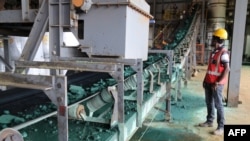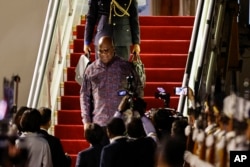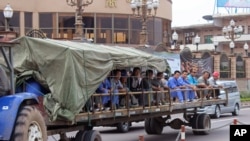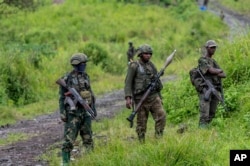Officials from the Democratic Republic of Congo will be heading home from the two-day Forum on China-Africa Cooperation in Beijing with limited success in their bid to expand economic relations beyond the mineral exports that have dominated trade, analysts say.
“The Chinese will continue to want to consolidate their position in Congo, including on minerals,” says Jean-Pierre Okenda, a Congolese consultant on mining issues.
Although the DRC has a trade surplus with China, while most African countries have large deficits, almost all of it is from minerals China is buying to feed its manufacturers that are hungry for raw materials.
The central African nation is the world’s largest producer of copper and cobalt, a metal used in electronics and a key material for batteries used in electric vehicles. The DRC has about 70% of the planet’s cobalt reserves.
Expanding trade, investment?
China’s customs authority shows trade flows to the DRC dropped 13% last year to $18.75 billion compared with 2022, the vast majority of it due to China's decreased imports from the DRC, which dropped by nearly 14% to $14.27 billion.
While the drop was largely due to fluctuating prices, it underscored how deeply the DRC, one of the poorest countries in the world, relies on China.
China is by far its largest single trading partner, representing nearly half of its merchandise exports and more than a quarter of its imports, according to 2022 data from the World Trade Organization.
Congolese President Felix Tshisekedi was the first African leader to meet with Chinese President Xi Jinping ahead of the conference. According to a statement from his office, Tshisekedi made it clear he wants to see bilateral trade expanded to other sectors “such as agriculture, renewable energy and especially industrialization through the local processing of the DRC's mineral wealth.”
China’s Ministry of Foreign Affairs said ahead of the forum that Xi declared his nation is ready to “deepen cooperation in agriculture, mineral products processing, vocational training and other fields.”
Many in the Congolese leadership were hoping to come away from the conference with large pledges of Chinese investment in the country.
Julien Paluku, the DRC’s trade minister, on Thursday published a plea for Kinshasa to be given a large chunk of the $50 billion that Xi promised at the conference to invest in Africa over the next three years.
“We focused our arguments on DRC's pivotal role in the Belt and Road Initiative, highlighting its strategic location as a connectivity point from North to South and East to West across the African continent,” he wrote on X.
Business climate
Christian-Geraud Neema, a Congolese researcher on China-Africa relations and the Francophone Africa Editor of the China Global South Project, says complaints about the investment climate in the DRC are an issue.
“There is a sort of reluctance to increase projects,” he says, referring to Chinese investments in Congo. “China will make promises, but not very committed promises.”
The DRC is one of the most corrupt countries in the world, ranking 162 out of 180 countries in Transparency International’s corruption perceptions index.
Chinese businesses have also come under increasing pressure under Tshisekedi’s administration, with the government working to renegotiate long-standing deals with Chinese mining firms.
In January, the Congolese government concluded talks on renegotiating a deal with the Chinese consortium running Sicomines, a copper-cobalt mine in Congo’s southeast. That renegotiation saw the investors behind the consortium agree to spend a massive $7 billion on developing infrastructure, such as badly needed roads and bridges, in the DRC.
Another Chinese company, CMOC, which runs the largest copper-cobalt mine in the world, situated in the DRC, agreed to pay $2 billion to the Congolese state last year after a commercial dispute.
Although many analysts believe those mining deals are still favorable to China, the uncertain business environment and the costs associated with rampant corruption have caused unease, say analysts.
“The operating conditions in Congo, everyone knows what they’re like,” says Okenda, explaining that Chinese firms were among the few willing to brave Congo’s tough business environment.
Defense cooperation
Defense is another area where some in the Congolese administration had been hoping for more cooperation in light of the country’s struggle to end the brutal conflict in eastern DRC.
Tshisekedi’s office said that he discussed security concerns with Xi and that he “praised China's influence on the lifting of the [U.N.] arms embargo on the DRC while it is unjustly attacked by Rwanda and M23 terrorists.”
The M23, a Rwandan-backed rebel group, has captured swathes of territory in the region since launching a rebellion in late 2021 and displaced more than 1 million people from their homes.
The DRC’s army, which critics say is weak and plagued with corruption, has struggled to fight back, losing battles and territory. But the DRC army did purchase nine high-tech Chinese CH-4 Rainbow attack drones, which it has used effectively in battle despite some being shot down.
Jean-Pierre Bemba, who was the DRC’s defense minister before moving to the transport portfolio in April, said in Beijing this week that he hoped China and the DRC could go beyond their traditional areas of cooperation and work more closely on defense.
Analysts are skeptical the defense relationship will go much further. Okenda, the mining consultant, said that “China’s interest isn’t in defense,” and that Beijing's overriding concern was natural resources.
Neema, the researcher, said that the prospect of a minerals-for-arms deal with Chinese firms had been a vague idea for years, but that Congolese leaders had never pursued it for fear of angering the United States, another important diplomatic partner.
He said closer defense cooperation remained unlikely, unless the situation in the eastern DRC deteriorates further.
“Expediting military factors could push the Congolese government to make a deal,” he said.
China’s Ministry of Foreign Affairs, in their statement on Xi’s meeting with Tshisekedi, indicated he made no reference to defense cooperation and gave only a boiler plate comment about working together for peace.







